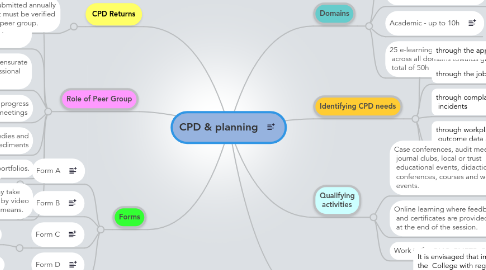CPD & planning
作者:Captain Walker

1. Forms
1.1. Form A
1.1.1. Prepares for discussion with peer group
1.2. Form B
1.2.1. Records peer group meeting at start of the year
1.3. Form C
1.3.1. Records CPD activities
1.4. Form D
1.4.1. Records review with peer group
2. Role of Peer Group
2.1. elect the peer-group coordinator
2.2. review and identify learning objectives linked to clinical, academic and professional practice in support of their CPD
2.3. approve CPD activity commensurate with each individual’s professional development
2.4. document meetings, progress of peers and future meetings
2.5. provide advice, remedies and support for any impediments
2.6. ‘sign off’ CPD portfolios.
2.7. Peer-group ‘meetings’ may take place by conference call, by video link or any other suitable means.
3. CPD Returns
3.1. A return should be submitted annually to the College and it must be verified by a member of the peer group.
4. Domains
4.1. Clinical - upto 50 h
4.2. Professional - up to 10
4.3. Academic - up to 10h
4.4. 25 e-learning hours can count across all domains towards grand total of 50h
5. Identifying CPD needs
5.1. through the appraisal process
5.2. through the job-planning process
5.3. through complaints and adverse incidents
5.4. through workplace-based assessments, outcome data and audit
5.5. identified by the peer group.
6. Qualifying activities
6.1. Case conferences, audit meetings, journal clubs, local or trust educational events, didactic teaching, conferences, courses and workshop-type events.
6.2. Online learning where feedback and certificates are provided at the end of the session.
6.3. Work in/for GMC, PMETB, RCPsych
7. Link to Appraisal
7.1. It is envisaged that individuals who are in good standing with the College with regard to CPD will not have to provide further detailed evidence of CPD at appraisal unless requested by their appraiser. It is important therefore that the peer group has a robust system in place for approving and monitoring CPD activity in order that the College and appraisers can be assured of the quality of the information contained in the returns.


